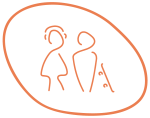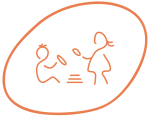From the moment of birth children instinctively exhibit essential primitive reflexes. This is the case, for example, with the sucking, grasping and crawling reflexes.
By repeating them, infants develop and automate their sensory-motor skills. This is how a network of communication between all the parts of the nervous system gradually develops and takes shape, guaranteeing the proper motor, sensory and cognitive development of infants, children and adults.
Recent studies have shown that failure to integrate a reflex can create interference in the body, affecting natural movement. This initial lack of integration is particularly noticeable after the age of five, when it has an impact on the child's capacity to learn.
The interference from these reflexes further affects the child’s development as it requires effort to compensate – energy which is then not available for other tasks.
Care adapted to every age group
Infants
Sensory activities done with Mum or Dad encourage the correct development of the reflexes. These are gentle sessions which establish good communication so that parents can learn to understand their child’s needs. These can often be obscured when he cries either from tiredness, reflux or fear. It also helps parents understand their child’s sleep cycles.
The benefits: to release tension and better understand your baby.


Early childhood
This is a period when experimentation is essential for motor, sensory and cognitive development. There is a specific chronology and anything that gets in the way can affect this phase of experimentation and prevent the integration of primitive reflexes. Sessions with Mum are focussed on body movements and motor skills, which will encourage the integration of reflexes and the release of physical tension.
Children
This is the time when the nervous system connections are established and we will check for each of the reflexes needed for the development of motor skills. During this phase it’s important for their development that children explore as many varied movements as possible. Developing movements in this way will help him feel more comfortable with himself and more at ease. This will help him to better benefit from his learning at school.


Teenagers
Adolescence is a time of great vulnerability and teenagers often appear to be in a state of crisis as they respond to, and protect themselves from, a whole range of anxieties. Teenagers are affected by physiological, psychological and emotional upheavals which can induce stress and anxiety. This consequently impacts their emotional stability and self-confidence. Working on emotional reflexes will help them to refocus and feel more secure. We work specifically to address the feeling of awkwardness many teenagers may feel. We target self-confidence, motivation, organization but also attention and concentration.
Adults
Adults whose primitive reflexes have not been integrated have usually created numerous energy-intensive compensation systems. Their brain has to constantly correct their movements, leading to stress, chronic fatigue, lack of confidence, poor posture and tension in the body. As an example, they may feel that they no longer know how to organise and manage their day-to-day life, they start everything and don't finish anything.


Seniors
Working on the integration of primitive reflexes is also very useful for the elderly. By repeating simple movements, they can improve their coordination and the fine motor skills they need for everyday tasks such as getting around, cooking, sewing, drawing, crafting and playing sport, as well as reading, writing and talking. Our training programme to stimulate brain function will enable them to make the most of their retirement.


